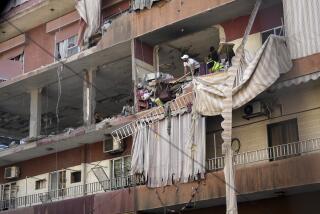Saudi Hierarchy’s Somber View: War May Be Inevitable : Persian Gulf: Saddam Hussein has ‘gone too far to turn back now,’ one senior official says. ‘His loss of face would be fatal.’
- Share via
SAUDI ARABIA — As prospects for a diplomatic solution to the Persian Gulf crisis diminish, a grim consensus is emerging among Saudi Arabian officials that war with Iraq may be unavoidable.
This conviction, expressed with growing resolve by Saudi officials over the past week, in turn reflects a now widely shared perception that Iraqi President Saddam Hussein is, in the words of one member of the Saudi royal family, “a psychopath” who represents “an intolerable threat to the region so long as he remains in power” in Iraq.
“We do not see any prospect of a diplomatic settlement,” Saudi Foreign Minister Prince Saud al Faisal said Saturday, conceding in public what other officials have been saying privately for several days.
Publicly, the Saudis continue to insist that Iraq agree to withdraw from Kuwait as a condition for further negotiations. But in private they say they have little expectation that Hussein will do that.
“He’s gone too far to turn back now,” said one senior official. “His loss of face would be fatal. The magnitude of his misadventure would kill him.”
When Iraq invaded Kuwait on Aug. 2, Hussein was counting on two things to intimidate his Arab brethren into accepting the new status quo--his 1-million-member army, the largest in the Middle East, and his own emerging appeal as a champion of the frustrated Arab cause.
“He really could have become the new Gamal Abdel Nasser,” a Saudi official said, referring to the late and immensely popular Egyptian leader. “It was happening. He was winning the hearts and the minds of the Arabs until he went the wrong way.”
Hussein’s call for a “holy war” against what is popularly perceived as the domination of pro-Israeli, Western interests in the region did strike a resonant chord in Jordan and the Israeli-occupied West Bank of the Jordan River, where the failure of the intifada , as the Arab uprising there is known, has created a mood of bitterness and despair among Palestinians living under Israeli rule.
But his threats backfired elsewhere, one Saudi official said, because he went too far, raising the ante too quickly and too violently to leave room even for appeasement.
“If someone holds a knife to your throat and says ‘give me your money,’ you do it. But if you become convinced that he is going to stab you anyway, then you fight for your life,” the official said.
“Every time we think we see a solution, this guy (Hussein) goes on TV and shuts the door to it,” a member of the Saudi royal family added. “We have no choice but to stand up to him.”
Now, emboldened by the multinational military presence taking shape in the eastern desert, Saudi thinking has shifted from ways of containing Hussein to ways of exorcising him from the Arab body altogether.
That will come about, Saudi officials say, when the Iraqi military becomes so desperate that it either assassinates Hussein or lashes out in a way that justifies retaliation by the formidable array of Western and Arab forces now aligned against Iraq.
“The only thing we still need now,” a Saudi businessman commented, “is one brave Iraqi soldier.”
In the meantime, the transformation that has overtaken this cloistered kingdom in the early hours of its greatest crisis is nothing short of remarkable, diplomats and other Middle East experts say.
Indeed, in just a little over two weeks, the mood here has turned from one of extreme apprehension to one of almost cocky confidence, with young Saudi princes talking avidly about what B-52s could do to Baghdad as their elders entertain dinner guests with the latest Saddam Hussein jokes.
The transformation, if further proof were needed, is even more evident in the Saudi treatment of the media.
Saudi Arabia used to be one of the most difficult countries for Western journalists to visit. But over the past week, the Saudis have literally thrown open their doors to an invasion of reporters from around the globe, providing unprecedented access to military facilities and senior government officials.
One journalist who has covered this part of the world for a number of years could hardly believe his ears when he overheard a Saudi official asking an American military officer for advice on how to set up a media pool. “The Japanese are in Jidda today. The Brits have just landed. We are going crazy,” the harried official confessed.
In this time of testing, the Saudis have even discovered a sense of humor about themselves--something for which they were not generally known.
“Our ministry of information is still denying that Iraq has invaded Kuwait,” one Saudi prince said over dinner the other night, eliciting much laughter from his guests.
“Have you heard? 50,000 more American soldiers arrived today,” said another Saudi. “They had to turn around and go home because we wouldn’t give them visas.” Howls of laughter this time.
Such humor veils, but does not entirely conceal, concerns that the crisis could still take an uncontrollable turn.
The threat that Iraq may use its chemical weapons is one such concern.
“A friend told me not to worry because the missiles the Iraqis have to deliver chemical weapons are not accurate and land many kilometers from their targets,” a Saudi businessman said. “I thought of my home and told him that’s exactly why we should be worried.”
Another concern is over what will happen if the crisis turns into a long stalemate.
Arab resolve is firm now, in the face of a clear and present danger, but may be more difficult to maintain in the months ahead.
More to Read
Sign up for Essential California
The most important California stories and recommendations in your inbox every morning.
You may occasionally receive promotional content from the Los Angeles Times.













